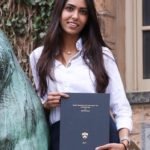Sofia describes her journey to understanding her own identity through the pursuit of knowledge and wisdom. Her story illustrates the ways in which spiritual wisdom coincides with academic wisdom, and how a balance of different forms of knowledge have contributed to her own world view. Sofia is also a recipient of MALA’s Scholarship Program for 2018. In my family’s native Pakistan, all names have a meaning, and I believe that there is an implicit hope that a child will actualize the name that his or her parents have chosen. Names like Jahangir, ‘conqueror of the world’, and Yadullah, ‘hand of God’ are not uncommon. Perhaps I, Sofia, should be relieved that my name only means wisdom; the responsibility of attaining wisdom seems a much easier task than conquering the world. I believe that my name and its meaning have implicitly defined my identity since my childhood. For instance, my parents have always emphasized the importance of education, and as a result, I became eager to seek knowledge early in life. This search for knowledge has been a life long identity journey for me and is how I define myself.As I grew older, I often turned to my religious background, and in particular Sufi teachings, to seek out knowledge. Sufi teachings have led me to pursue service and knowledge. Death Before Dying, one of my favorite Sufi texts, advises the reader to destroy their ego to achieve enlightenment. In this text, the 17th century mystic, Sultan Bahu, recommends conscious elimination of vanity, greed, and other egoistic traits. Following Bahu’s advice is something I find increasingly difficult today, especially in an age where self promotion through social media has become the norm. I have recognized that service to humanity is the mechanism by which I am able to maintain my humility and minimize my own ego. In addition to driving me to reflect on humility and service, Sufism has also pushed me to seek out knowledge more ardently. In Arabic, the word ‘Muslim’ means ‘one who has surrendered’, and it is assumed to mean ‘surrendered to God’. My own belief, influenced by Sufism, is that the phrase also means ‘surrendered to the truth’. Surrendering to God seems to evoke an attitude towards life that is passive, while ‘surrendering to the truth’ implies an active life of constantly seeking knowledge.Leaving home in Chicago to attend Princeton University was a critical point in my identity journey, as I was met with an amazing opportunity to seek out knowledge outside of religion. I sought to apply my knowledge practically as well. Participating in research on Orb mutant Drosophila oocytes excited me about uncovering new knowledge in the area of genetics, while simultaneously making me aware of how much is still unknown about the way genes operate and interact. Outside of the science arena, I was excited to explore a new language and studied Persian Farsi and Tajik during my four years in university. I recognized during this period that culture shapes our view of the world, and that exploring a new language provides a unique vista on the culture of the respective society. Particularly, the phrases and proverbs that exist in other languages divulge the most important values of their respective cultures. For instance, ‘Pedaram dar amad’- literally ‘my father came out’- is used in Persian to indicate that you worked hard for something and were successful. The phrase simultaneously indicates respect for one’s father- an important Iranian value- by saying that you accomplished something with the dedication your father would have displayed. The way we speak is inextricably related to our interpretation and understanding of our experiences, and I have found that studying foreign languages continues to give me perspective on life outside my own environment.My experience participating in knowledge creation through research and exploring my academic interests led me to where I am currently, as a first year student at the Yale School of Medicine. At this point, my identity is still rooted in a lifelong search for knowledge, but I have narrowed my focus onto medicine. Since starting medical school, I have become involved in research on alcohol dependence, and I am eager to continue contributing to this field, with the aim that my discoveries in this space may lead to more effective medical treatments options.Medicine is a field of constant learning, whether to keep up with new technologies, pass licensing examinations, or pursue research, and I have reached a point where I know that I will always continue learning throughout my career. As such, my identity journey is now shifting towards working to ensure that I actualize the meaning of my name. Ultimately, wisdom is not the same thing as the amassment of knowledge. Wisdom, defined as “the quality of having experience, knowledge, and good judgment,” is clearly more than just knowledge. While experience can only come with time, I am now focused on the ‘good judgement’ aspect of wisdom. My experiences in academia and health care have led me to believe that good judgement in my own career can be cultivated two things- avoiding intellectual vanity and actively sharing knowledge with those who may benefit from it. In the coming years, I anticipate working to produce new knowledge within medicine, but more importantly, I hope to work towards creating a more inclusive, knowledge sharing culture among different countries and communities within medicine. Within medicine and science, but also within other arenas, there is an immense amount of knowledge being produced daily. Unless an active effort is made to share this knowledge globally, populations around the world will continue to experience a knowledge deficit, and my aim for the next leg of my identity journey is to work towards bridging this gap within healthcare.
SUBSCRIBE

MALA
Muslim American Leadership Alliance
Chicago
Recognition
Copyright © 2023 All Rights Reserved

